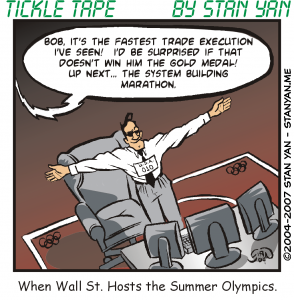Trading is one of the most unpredictable and chaotic professions that one can pursue. This disarray and chaos produce stress. If you don’t take appropriate precautions, for example, you can look at your computer screen and literally watch your net worth melt away, like a 1000-pound block of ice on a hot parking lot. It’s difficult to avoid remembering that it is real money that you can spend on your basic needs—food, rent, mortgage payments, education for your children, gifts for your spouse, a new car, or vacations.
The list of what you can buy with that lost money is endless. If that isn’t enough, there is the social side of loss. Explanations are “required” for your spouse. Your children must be told why they can’t have the current indulgences that all the other neighbourhood kids have. It’s embarrassing to explain to friends and relatives that you’ve lost. The emotional stress can be unbearable, resulting in physical infirmities, like ulcers or heart problems. Even making large sums of money can be stressful.
Once you pile up a huge profit, there is the risk of losing it, the need to guard it, and the desire to preserve the lifestyle to which you have become accustomed. It’s tempting to cope with the stresses and strains brought on by trading by pretending that they don’t exist, but when you do, you will find yourself unprepared for dealing with all possible contingencies. In the end, avoidance produces even more stress, and emotional driven trading, which in turn, results in huge losses and further elevated stress levels.
When it comes to trading, the outcomes are uncertain. That’s a fact. It’s how the game works. Thus, before you enter the game, it’s essential to be aware of and accept all possible outcomes, and have a specific plan for knowing how to deal with each one. By doing so, you’ll not only alleviate stress but trade more profitably and consistently in the long run. What steps are you going to take if you win big, win small, lose big, lose small, or just break even? These are the five possible outcomes of every trade you enter.
Do you know specifically what you would do under each of these outcomes? A fatal mistake of many novice traders is not considering all possible outcomes and making a well-detailed plan ahead of time before they even open a trade. By failing to anticipate unpleasant outcomes, such as losing money or breaking even, they panic upon facing these outcomes and act emotionally. It is one of the most common reasons novice traders go under the first time they attempt to trade actively.
But the fact is, you will tend to lose more often than win, especially when you are first starting out. That’s why it is important to accept that you may implement a trading strategy that fails, and prepare for it by devising a specific exit strategy before you put on a trade. Make your exit strategy specific and write it down. What are you going to do if you win big? Will, you quit while you are ahead?
Take your initial grubstake off the table and trade with only house money? Or will you trade without giving any thought to the future? How will you handle winning small, breaking even, losing a little, or blowing out completely? Whatever you decide to do, it is wise to consider the various possibilities upfront. Don’t put it off until later. It is your life, your money, and your destiny—put some serious thought into it. Consider both the upsides and the downsides before you get so involved that the game is playing you, instead of you playing the game.


